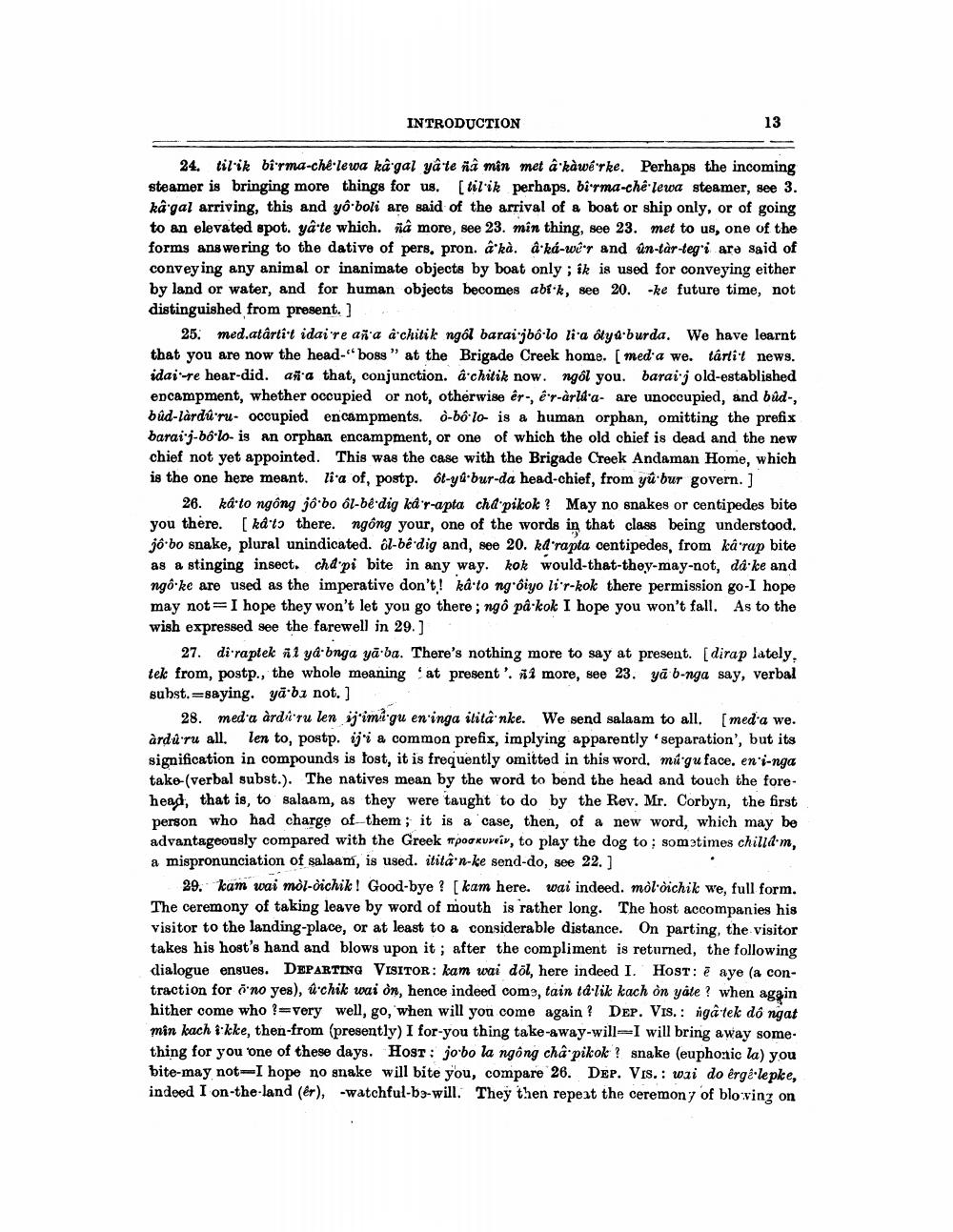________________
INTRODUCTION
13
24. til'ik birma-che-lewa kâ gal yâ te nå min met a kàwerke. Perhaps the incoming steamer is bringing more things for us. [tilik perhaps. birma-chê lewa steamer, see 3. kâ'gal arriving, this and yô boli are said of the arrival of a boat or ship only, or of going to an elevated spot. yâte which. na more, see 23. min thing, see 23. met to us, one of the forms answering to the dative of pers. pron. a kà. a ká-we'r and un-làr-teg i are said of conveying any animal or inanimate objects by boat only ; ik is used for conveying either by land or water, and for human objects becomes abiók, see 20.-ke future time, not distinguished from present. ]
25.med.atârtit idaire aña a chitik ngôl barai-jbô-lo lita oty a burda. We have learnt that you are now the head." boss" at the Brigade Creek home. ( media we. tarti't news. idaire hear-did. aia that, conjunction. â'chitik now. ngôl you. barai j old-established encampment, whether occupied or not, otherwise êr., êr-årld'a- are unoccupied, and bûd-, búd-làrdú ru- occupied encampments. ò-bô-lo is a human orphan, omitting the prefix barai-j-bôlo- is an orphan encampment, or one of which the old chief is dead and the new chief not yet appointed. This was the case with the Brigade Creek Andaman Home, which is the one here meant. lita of, postp. 6t-ya-bur-da head-chief, from yû bur govern. )
26. kâ to ngông jô bo ôl-be-dig kâ'r-apta cha pikok? May no snakes or centipedes bite you there. [káto there. ngông your, one of the words in that class being understood. jo bo snake, plural unindicated. ôl-bê dig and, see 20. kd rapta centipedes, from ka rap bite as a stinging insect. chd pi bite in any way. kok would-that-they-may-not, da ke and ngô ke are used as the imperative don't! kâ·to ngôiyo li'r-kok there permission go-I hope may not=I hope they won't let you go there; ngô på-kok I hope you won't fall. As to the wish expressed see the farewell in 29. ]
27. di-raptek ni ya bnga yā:ba. There's nothing more to say at present. [dirap lately, tek from, postp., the whole meaning at present'. ni more, see 23. ya bunga say, verbal subst.=saying. ya ba not. )
28. med a ardú ru len ij'imigu en'inga ilità nke. We send salaam to all. [med a we. àrdú ru all. len to, postp. ij'i a common prefix, implying apparently separation', but its signification in compounds is tost, it is frequently omitted in this word, mi gu face, en i-nga take-(verbal subst.). The natives mean by the word to bend the head and touch the forehead, that is, to salaam, as they were taught to do by the Rev. Mr. Corbyn, the first person who had charge of_them; it is a case, then, of a new word, which may be advantageously compared with the Greek porkuveiv, to play the dog to; sometimes chilldım, a mispronunciation of salaam, is used. ititâ n-ke send-do, see 22. ]
29. kam wai mol-qichik ! Good-bye? [kam here. wai indeed. molòichik we, full form. The ceremony of taking leave by word of mouth is rather long. The host accompanies his visitor to the landing-place, or at least to a considerable distance. On parting, the visitor takes his host's hand and blows upon it ; after the compliment is returned, the following dialogue ensues. DEPARTING VISITOR: kam wai döl, here indeed I. Host: 2 aye (a contraction for o'no yes), û'chik wai on, hence indeed com, tain td-lik kach on yáte? when again hither come who ?=very well, go, when will you come again ? DEP. VIs.: ngâ tek dô ngat min kach ikke, then-from (presently) I for-you thing take-away-will-I will bring away some thing for you one of these days. Host: jo bo la ngông châ pikok ? snake (euphonic la) you bite-may not-I hope no snake will bite you, compare 26. DEP. Vís.: wai do êrgê lepke, indeed I on-the-land (er), -watchful-b3-will. They then repeat the ceremony of blo ving on




